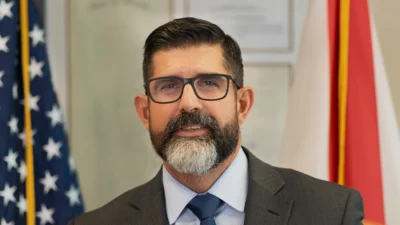Awards Florida Tech’s | Florida Institute of Technology / fit.edu
Awards Florida Tech’s | Florida Institute of Technology / fit.edu
MELBOURNE, FLA. — Two Florida Tech faculty members have been awarded a combined $150,000 from the Community Foundation for Brevard to support their research into Alzheimer’s disease.
The recipients are Eric Guisbert, associate professor in the university’s Department of Biomedical and Chemical Engineering and Sciences and program chair for biomedical sciences, and Mark Harvey, associate professor in the School of Behavior Analysis.
Guisbert will receive a $100,000 grant to pursue his proposal, “Development of heat shock response activators as new therapeutics for Alzheimer’s disease.” Harvey will receive $50,000 to move forward on his proposal, “Effect of Biological Lighting on Sundowning and Related Functional Behavior in Alzheimer’s Disease.”
Award recommendations are made by the Community Foundation’s Medical Research Advisory Committee.
Guisbert is conducting research focused on testing a new strategy for treatment of Alzheimer’s disease. Alzheimer’s disease is characterized by the accumulation of protein aggregates. Most of the previous research has focused on beta-amyloid plaques that form outside of cells, but thus far therapies that target this feature alone have not been effective.
He has shown that activation of a cellular defense pathway known as the “heat shock response” can be beneficial against both beta-amyloid plaques as well as a second feature of Alzheimer’s disease, neurofibrillary tangles that form inside of neurons.
The Guisbert lab will now use this knowledge to identify small molecules with therapeutic potential. They will use an animal model for neurofibrillary tangles where human tau is expressed in the neurons of C. elegans, a small roundworm, causing cell death and paralysis. Promising candidates will also be tested in an animal model for beta-amyloid plaques and validated using cultured human cells. At the end of this project, the Guisbert lab hopes to identify new compounds that can be further developed into Alzheimer’s disease therapeutics.
Harvey and colleagues will examine sundowning in Alzheimer’s patients: Altered sleep and activity patterns, and increases in behavioral disturbances, such as wandering, attempts to leave secured units, aggression and noncompliance with medical care. Despite the growing awareness of sundowning and associated behavioral challenges, little behavioral research exists regarding possible causes or methods for reducing associated behavior problems, Harvey reports.
“We propose to investigate occurrences of sundowning behaviors in elders with Alzheimer’s disease (AD) throughout the day, while they attend an adult day center in Brevard County,” according to the abstract. “An extension of this project would include an assessment of potential changes in sleep, activity levels, and behavior patterns of elders with AD under varied lighting conditions at an adult day care program.”
The Community Foundation for Brevard uses a competitive grant process to award medical research grants from its Kenneth R. Finken and Dorothy Hallam Finken Endowment Fund. The overall goal of the program is to support research in the fields of Alzheimer’s disease, cancer, and other pervasive diseases.
In 2022, the program will focus exclusively on Alzheimer’s research with four areas of focus: social/behavioral interventions; public health education and awareness; clinical research; and clinical trials.
“Kenneth Finken was absolutely committed to alleviating the devastation caused by Alzheimer’s disease,” said Theresa Grimison, Community Foundation president and CEO. “We are honored to carry Mr. Finken’s philanthropic vision forward through the support of these brilliant researchers.”
Kenneth Finken was an MSEE graduate of Columbia University and held four patents. He retired from the Government Electronic Systems division of what was then the Harris Corporation. As part of his estate plan, Mr. Finken made a bequest to the Community Foundation for Brevard. Over the last 14 years, through this generous legacy gift, Florida Tech researchers have been awarded 26 individual medical research grants via the Community Foundation that have a combined value of more than $877,000.
Original source can be found here.




 Alerts Sign-up
Alerts Sign-up